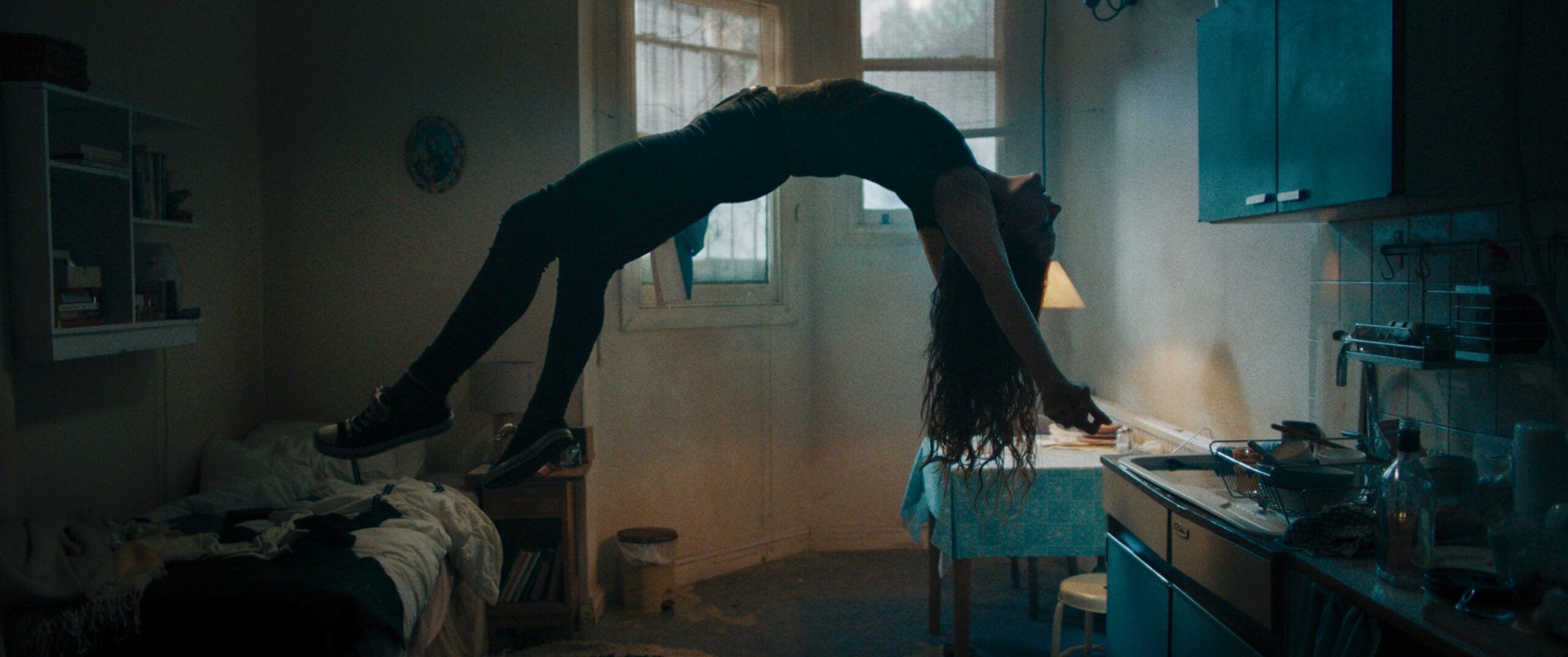Director Rose Glass on her critically-acclaimed debut film, “Saint Maud.” Also, Amy Gentry on her propulsive crime novel, “Bad Habits.” And comedian Mike Drucker tells us why he wrote a book about the landmark video game, “Silent Hill 2.”
Featured in this Show
-
The Horror Of Saving A Soul: Rose Glass On Her Debut Film 'Saint Maud'
Rose Glass was only 29 when “Saint Maud” premiered at the Toronto International Film Festival in 2019. The movie is an intense, riveting horror film that focuses on a young woman named Maud, a palliative care nurse for an American dancer and choreographer named Amanda.
Amanda is terminally ill with stage four lymphoma. Maud believes God speaks to her directly and that their special relationship can help save Amanda’s soul. Glass wrote and directed “Saint Maud” which is now streaming on the EPIX cable network.
“I started coming up with an early version of the idea just as I was finishing film school in 2014,” Glass told WPR’s “BETA.” “I was interested in the idea of doing a two-hander between a woman and a voice in her head, and then the story developed very gradually and slowly from there over the next few years.”
One of the challenges Glass faced in writing the screenplay was making the narrative operate on two levels — the real world story and Maud’s own story. She described the process as “an ongoing sort of balancing act.”
“The lens that we see everything through is obviously through Maud’s perspective,” Glass explained. “And in her mind, it’s very unambiguous what’s going on. And she is in communication with God, and she’s on this mission and that’s what’s happening.”
Glass has said she wanted her film to appeal to both people who believe in God and people who don’t. That’s why she tried to think of a universal way of connecting with God that even secular audiences would find accessible.
“I didn’t want it to just be this sort of lofty academic thing that we just take it at her word that she’s talking to God,” she said.
Maud goes to such extreme lengths for the love of this God that Glass felt the audience needed to understand Maud is experiencing something outside the ordinary.
“The point of the film for me was never in any way to kind of be Christian bashing because I think there’s plenty of that that goes on anyway,” Glass explained. “Obviously, I have my cynicism and deep suspicions of a lot of things to do with organized religion.”
For Glass, it’s a more of an emotional psychological film than it is about spirituality.
Welsh actor Morfydd Clark plays Maud, delivering an outstanding performance throughout the movie.
Glass said she would love to be able to say Clark played the part of Maud exactly as Glass wrote it. But Clark turned the character into something much more complicated.
“She’s just a phenomenal actor,” Glass said. “And her range is insane. She made my job a lot easier because both her and Jennifer (Ehle, who plays the woman Maud is looking after) get things really quickly.”
Glass used the word “Godgasms” to describe the ecstatic experiences Maud is subject to at various times throughout the film.
“God is coursing through her, and she appears to be having an orgasm,” Glass explained. “For people who don’t believe in God, the idea of being touched by God probably doesn’t resonate with them.”
“But suddenly being struck down by an orgasm, I think we sort of can imagine what that that feels like.”
Despite the obvious sexual connotations involved with an orgasm, Glass sees the “godgasm” as more of “a kind of euphoric, transcendent hallucinogenic kind of thing.”
Without giving away any spoilers, “Saint Maud” has a very powerful ending.
“It doesn’t go well at the end. I knew I wanted to get to that point for quite a long time,” Glass said. “The mechanics of the story, in particular the act leading up to it, that changed around a lot during script writing. And that was the bit I was most kind of stuck with and kind of banging my head against a brick wall for ages. It felt like to end it any other way by that point would feel like a bit of a cop-out.”
-
Amy Gentry Skewers Academia In Gripping Novel 'Bad Habits'
Amy Gentry’s latest crime thriller, “Bad Habits,” is a propulsive psychological thriller about Mackenzie Claire Woods and Gwendolyn Whitney.
Mac and Gwen used to be the best of friends, so close they considered themselves sisters. But their relationship changes dramatically when they’re both admitted to the cutting-edge Emerging Studies program at Dwight Handler University in a northern industrial city and competing for a fellowship that could change their lives. The pressure ramps up to the point that they become enemies.
Gentry drew on her grad school experience at the University of Chicago to write “Bad Habits,” which is her third novel. But as she describes herself on Twitter, she’s an “accidental crime writer.”
When she started writing her first novel, “Good as Gone,” Gentry thought of it “as a family drama,” she told WPR’s “BETA.” Even when she was feeling very confident about it, Gentry viewed the book as a literary novel, a kind of psychological fake-out novel in the tradition of author Henry James.
Gentry explained that when she read Gillian Flynn’s “Gone Girl,” it really helped her see the draft of her work in progress in a whole new way.
“It just snapped something into place for me about the way that different voices in a novel can provide a twist without really providing a real twist,” she explained. “I really love the phenomenon of the different points of view that you can flip back and forth between. And each one, depending on who you sympathize with or identify with, provides an entirely different picture of the same events. It’s a bit ‘Rashomon‘ as well.”
Mac and Gwen, the central characters of “Bad Habits,” came to Gentry in a dream. She said that isn’t usually the way the idea for a novel comes to her. But in this case, “the vision of these two women reuniting in a hotel lobby after years apart, knowing that they had been once best friends and that now one of them wanted to kill the other is almost all I knew” from the dream.
Mac and Gwen have known each other since high school. When Gwen moved to town, she and Mac quickly struck up a strong friendship. Mac struggles financially while Gwen never has to worry about money because her family is rich. The Joyner fellowship allows one very ambitious student from Dwight Handler University to spend up to two years doing dissertation research at any partner European university and live on a very generous stipend. As Professor Bethany Ladd tells Mac: “It’s as close to a guarantee of a tenure-track Research 1 job as you are likely to find in this fallen world.”
After a decade apart, Mac and Gwen encounter one another at a hotel bar in Los Angeles. Mac is now a professor who has just given a keynote address at an academic conference at the hotel.
Gentry knew she would tell the story from the point of view of Mac.
“I wanted her to feel a bit like Tom Ripley from the Patricia Highsmith novels.” Tom Ripley is a fictional con artist and serial killer that appears in five of Highsmith’s novels. Matt Damon played him in the 1999 thriller, “The Talented Mr. Ripley,” based on Highsmith’s 1955 novel of the same name.
Since attending the University of Chicago, Gentry has been waiting for the opportunity to use graduate school as a setting for one of her novels, and she thought “Bad Habits” was the perfect fit.
“What better place for a friendship to turn horrible and ugly than in a graduate program, a highly competitive one,” she said.
Gentry enjoyed creating Dwight Handler University and the Emerging Studies program, although a lot of that world building didn’t make it into the book.
“It was really important to me that readers be able to understand and inhabit this world as an outsider,” Gentry said. “But still, it couldn’t be too alienating. So I tried to really walk a line with the academic satire and not make it too inside baseball.”
Gentry came from a very laid-back undergrad experience and kind of accidentally fell into the University of Chicago’s grad school program where she earned a doctorate in English.
“And that became my life,” she said. “And learning with that kind of environment was like, you know, people behave in bad ways when they are under constant pressure and stress, when there is only a very narrow way for them to succeed and limited resources for success. As in academia, there’s no real job market for the humanities. And the people that you rely on to succeed in that environment are over you in this somewhat rigid hierarchy. They’re your advisors and professors, and yet there are no boundaries. You’re often encouraged to see them as peers and hang out with them as if they’re peers, and yet they have total power over you, over your career.”
Gentry said she enjoyed poking fun at academia but not just for the sake of saying they’re silly, because she doesn’t think that’s very interesting and academics do have value.
It was “more to just pull up the feelings under those jokes and show some ugly truths that are happening in that environment where structural inequality is often reproduced,” she said.
-
Comedy Writer Mike Drucker Goes Into The Fog Of 'Silent Hill 2'
Comedian Mike Drucker owes a lot of his writing career to his passion for video games. Before becoming the co-head writer and executive producer of the hit late night show, “Full Frontal with Samantha Bee” and even before a short-lived job at gaming giant, Nintendo, Drucker put himself on the radar with a series of hilarious articles about video games.
“I think that was a great opportunity for me because it was an area that wanted comedy. It wasn’t overcrowded and it was an area that I knew very well. So I was lucky enough to sort of get my start with that,” Drucker told WPR’s “BETA.”
Drucker would parlay his early work into high-profile writing gigs at comedy series like “Adam Ruins Everything,” “The Tonight Show with Jimmy Fallon” and an internship at “Saturday Night Live.”
While at “SNL” Drucker was even portrayed by actor Zach Braff in the recurring sketch “Bronx Beat” with Amy Poehler and Maya Rudolph. For his part, Drucker is flattered by this portrayal.
“It’s like if a popular band was like, ‘We love you so much. We’re writing a song about you,’” said Drucker. “It’s a small character in a recurring sketch series. But it feels like I have this little, tiny permanent blip in existence on that show.”
Seeing yourself parodied in an “SNL” sketch might be fun, but it isn’t something everyone experiences. However, Drucker was one of millions of video game players who related to the visceral experience of the 2001 horror video game, “Silent Hill 2.” Drucker writes about the power and legacy of “Silent Hill 2” and the personal impact the game had on him in his entry into the Boss Fight book series on seminal video games.
The game stands alone, both in the franchise and in video game history, for eschewing typical video game tropes of leveling up and unending combat for a more cerebral and psychological experience. In doing so, Drucker notes how the game addresses significant societal issues.
“The reason it was so unique for the time is because it handled very serious topics very maturely in a way few games had. Now, games have talked about war forever, but ‘Silent Hill 2’ was the first game that really, seriously dealt with emotional abuse,” said Drucker.
“Silent Hill 2” was released at the height of the “survival horror” genre of video games made popular by the “Resident Evil” franchise. It was defined by its trademark fog that made for a creepy and disorienting gameplay as the player worked to uncover the unsettling secrets of the isolated titular town of Silent Hill.
As the protagonist — but definitely not the hero — James, the player meets a strange cast of loners who themselves are on dark journeys of redemption or regret. Characters like Eddie who was severely bullied and Angela who is suffering from trauma at the hands of sexual abuse.
“Eddie is this character that sort of looks like either a very overweight teen or someone in his early 20s, but sort of a look that I had when I was a very overweight teen,” said Drucker. “I definitely related to someone who was so bullied or felt so bad as a teen that they turn inward and they become bitter and angry.”
Drucker who is open and frank about his own experiences with sexual abuse also related to the character of Angela and her journey dealing with sexual trauma. The game doesn’t treat it as a journey to be won and her story’s conclusion is ambiguous and fitting.
“The first time I played it, I really didn’t make the connection,” recalled Drucker. ” It wasn’t until working on this book, when I played through the game a bunch of times, that I really started to develop a really strong attachment to her in terms of what she went through. I definitely felt a lot more sympathy for her and I definitely felt a lot of catharsis, especially at the end when she sort of goes on her own way and says nobody can help her but herself, which for that character is a huge growth.”
As more and more landmark games from that era are getting remakes and remasters for current consoles and new generations of players, Drucker says the botched attempt at refining “Silent Hill 2” removed so much of the experience that made the game work in the first place. The 2012 HD upgrade — which Drucker likens to colorization of classic films in the 80’s — retracked the voices, softened the differences between gameplay and cutscenes and — perhaps most egregiously — removed the patented fog.
“It’s this abandoned town. It’s spooky. You know, sometimes it transforms into something even scarier. So the fog gives you that effect. We all know fog and horror. However, the fog also helped systems reduce processing power. If you have a ton of fog, you don’t need to process buildings in the distance because they’re hidden by the fog. So it was a technique that really helped artistically and in the upgrade they were like, ‘Oh, we don’t need this fog anymore because we can just process these buildings.’ But you remove the fog again, you remove a lot of the atmosphere.”
Drucker says that the lack of ability to experience the game as originally intended will dampen its legacy. However, he said that the psychological elements of the game can be found in several current day games including the Amnesia series and 2020’s game of the year, “The Last Of Us Part II.”
“The game is pretty influential now. Neil Druckman who wrote ‘The Last of Us’ said the game was very important to him. It’s this game that valued the character’s internal strife. It’s not what the characters can do. It’s why they’re doing it,” said Drucker. “‘Silent Hill 2’ was one of the first big budget mainstream games to do this.”
Episode Credits
- Doug Gordon Host
- Adam Friedrich Producer
- Steve Gotcher Producer
- Steve Gotcher Technical Director
- Rose Glass Guest
- Amy Gentry Guest
- Mike Drucker Guest
Wisconsin Public Radio, © Copyright 2025, Board of Regents of the University of Wisconsin System and Wisconsin Educational Communications Board.



